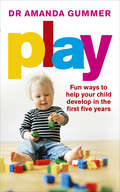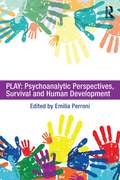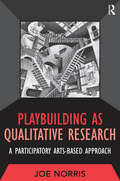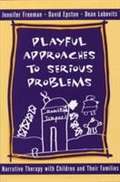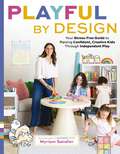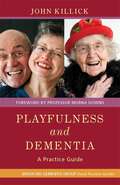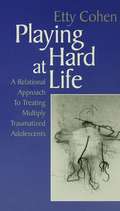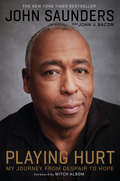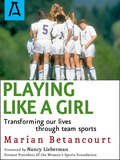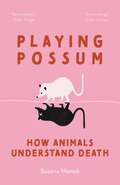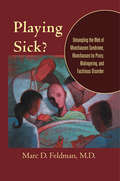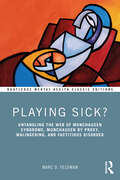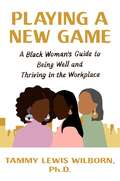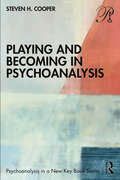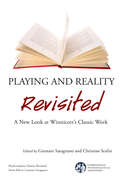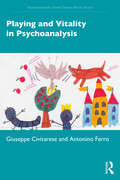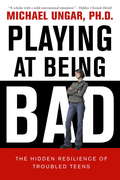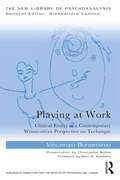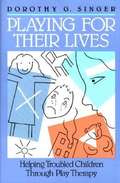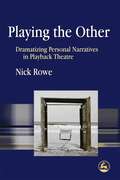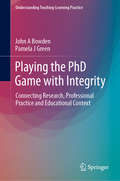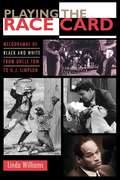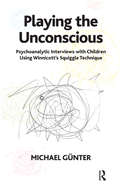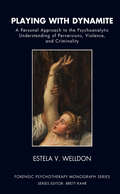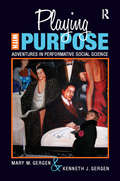- Table View
- List View
Play: Fun ways to help your child develop in the first five years
by Dr Amanda GummerPlay is a fantastic way to promote family cohesion, enhance child development, reduce stress and encourage parents and children to enjoy their family life. Play is a practical and inspiring book for all parents who want to support their child’s development in a fun and pressure free way. Written by a child development expert and play psychologist, it’s packed with activities and insights to help parents support their child through the critical first five years of life. Find out: · Why babies love peekaboo and how to promote attachment through laughter · What toys to buy and what games to play at each developmental stage and why · How to use musical play to lay the foundations for learning languages and maths · Ways to manage sibling rivalry, tantrums, ADHD and fussiness through games · Activities to increase mobility, creativity, confidence, cognitive and social skills Giving the confidence back to parents, and showing them that the tools they need are already at their fingertips, Play is for every parent who wants a playful and stress-free solution to helping their child to reach their full potential.
Play: Psychoanalytic Perspectives, Survival And Human Development
by Jeff Green Emilia Perroni Peter GandolfiIs play only a children’s activity? How is the spontaneous play of adults expressed? What is the difference between “play” and “game”? What function does play have during war? Play:Psychoanalytic Perspectives, Survival and Human Development explores the importance of play in the life of the individual and in society. Most people associate psychoanalysis with hidden and “negative” instincts, like sexuality and aggressiveness, very seldom with “positive urges” like the importance of love and empathy, and almost never with play. Play, which occupies a special place in our mental life, is not merely a children’s activity. Both in children and adults, the lack of play or the incapacity to play almost always has a traumatic cause – this book also shows the crucial importance of play in relation to the survival in warfare and during traumatic times. In this book Emilia Perroni argues that whether we regard play as a spontaneous creation or whether we see it as an enjoyable activity with defined rules (a game), that it is impossible to conceive human existence and civilization without it. The papers collected in this book are the results of the research offered on the subject of play by several Israeli therapists from different psychoanalytic schools Freudian, Jungian, Kleinian, Winnicottian and Self-Psychology. Other contributions are from Israeli researchers and academics from various fields such as literature, music, art, theatre and cinema, contemporary psychoanalysis and other disciplines. Play: Psychoanalytic Perspectives, Survival and Human Development offers new ways to think about, and understand, play as a search for meaning, and as a way of becoming oneself. This book will be of interest to psychoanalysts, researchers, therapists, parents, teachers and students who are interested in the application of psychoanalytic theory to their fields including students of cultural studies, art, music, philosophy. Emilia Perroni is a clinical psychologist, supervisor at the School of Psychoanalytic Psychotherapy at the University of Tel Aviv and the Bar Ilan University. She has a private practice in Jerusalem and in Tel Aviv. She is a member of the Israeli Association of Psychoanalytic Psychotherapy, the Israeli Association of Psychotherapy, she is an Associated-Member of the Israeli Institute of Jungian Psychology, and Research Fellow at the Van Leer Institute in Jerusalem.
Playbuilding as Qualitative Research: A Participatory Arts-Based Approach (Developing Qualitative Inquiry #5)
by Joe NorrisThis book is for both art-based researchers and research-informed artists, exploring the theatrical genre known as Collective Creation, or Playbuilding. Performers generate data around chosen topics— from addiction and sexuality to qualitative research—by compiling scenes from their disparate voices. Audience members become involved in the investigation, and the performed scenes do not end the conversation but challenge and extend it. Through discussion and audience participation, the process examines how knowledge is defined and how data is mediated.
Playful Approaches to Serious Problems: Narrative Therapy with Children and their Families
by David Epston Jennifer Freeman Dean LobovitsThe "grown-up talk" of therapy is likely to turn off children - especially if it focuses on their problematic behavior. The highly effective techniques of narrative therapy include children by respecting their unique language, stories, and views of the world. This book describes a basic theory of collaborative narrative play, as well as verbal and nonverbal techniques that clear the way for stories of hope, possibility, and change. Compelling case examples, drawn from the authors' work, will appeal to parents and educators as well as therapists.
Playful by Design: Your Stress-Free Guide to Raising Confident, Creative Kids through Independent Play
by Myriam SandlerHelp your kids grow into confident, creative, and independent little people by creating spaces in your home that foster independent play.Myriam Sandler, creator and founder of Mothercould, helps you give your kids the tools they need to unlock their imaginations and encourage kid-directed, kid-executed, and ultimately kid-enriching independent play using the materials and spaces you already have. Not only will this system help your children grow, it will also help foster a more connected, more productive, and happier home for your entire family.Through colorful photography and vibrant illustration Playful by Design is your blueprint for effortlessly designing, installing, and maintaining your own upgraded play spaces. Myriam Sandler has created a resource to help you—easily and affordably—create spaces for independent play, no matter how big or small your home is.Myriam shares activities that:Build problem-solving skillsEncourage social and academic developmentEngage children while building moments of play and connectionNurture independence and self-expressionHelp work through emotions, andOffer parents important parenting wins that benefit the entire family As your kids engage with self-directed, open-ended play, you'll realize what a game-changer this new dynamic is for the entire household. For the parents, there's no more feeling overwhelmed and stretched thin by unrealistic expectations about how to entertain your kids. And for your kids, you're giving them the most beautiful gift: the ability to be independent self-starters who are in touch with their own creativity. In short: everyone will feel happier, more energized, more fulfilled, and more connected.Myriam will help you:Plan the spaceDeclutterOrganize by type (and customize for various age groups!)Set up a toy rotation systemMaintain (easily and efficiently!) In addition to the how, Myriam explains the why. This beautifully designed book will equip you to understand the importance of independent play, as well as set it into motion. You'll discover that boredom can be a good thing, and you'll see how it can make their imaginations blossom. This type of play creates more time for your kids to grow as creative and independent little people; more time for you to do the things you need and want to do; more peace of mind that you are, in fact, giving your kids important tools they'll thank you for one day; and more opportunities to feel the joy of all of the above.
Playfulness and Dementia
by John KillickEstablishing playfulness as an essential component of dementia care, this positive and uplifting book will be key in changing attitudes and providing ideas for new and valuable ways of interacting and being with individuals with the condition. John Killick explores the nature of playfulness and the many ways in which it can enrich the lives of people with dementia, including as a means of maintaining relationships and communication, supporting communication and generally lifting the spirits. Specific approaches already in existence are described, including improvised drama, clowning and laughter yoga, and a chapter on the playful approach to art and craft activities is also included. Personal accounts of playfulness by individuals with dementia, relatives and an actor with a decade's experience of using playful approaches with people with dementia offer rich first-hand insights into its transformative potential. Throughout the book, the importance of spontaneity and of being with the person with dementia in the present moment is emphasised, and the reader is encouraged to develop a playful mindset. A selection of colour photographs amply demonstrate playful approaches in action. Offering a fresh and perhaps unexpected perspective, this book is essential reading for dementia care practitioners and managers, activity coordinators, therapists, people with dementia and their relatives, and anyone else concerned with the wellbeing of those with the condition.
Playing Hard at Life: A Relational Approach to Treating Multiply Traumatized Adolescents
by Etty CohenPlaying Hard at Life brings contemporary relational thinking to bear on the psychodynamic treatment of a notably difficult group of young patients. Working with New York City teenagers who have survived the wars of inner-city life and Israeli teenage soldiers who have survived the wars of the Middle East, author Etty Cohen documents the extraordinary challenges of forming a treatment alliance with these shattered youngsters, of engaging them psychodynamically, and of working toward a viable termination. The result is not only a poignant record of courage and committment (on the part of patient and therapist alike), but also a valuable extension of modern trauma theory to adolescence as a developmental stage with its own challenges and requirements.The heart and strength of Cohen's book is her vivid documentation of hands-on encounters with her adolescent patients, seen both individually and in group. Cohen makes plain that, with young people so horrendously traumatized, treatment assures a necessarily improvisational character. And yet, she argues, even in the type of pragmatic encounters dictated by massive and repeated trauma, contemporary relational theory provides a compass with which to navigate through the rocky shoals of the clinical work. Again and again, the reader is shocked by just how much happened to these adolescents, astonished at how resilient they proved to be, and, finally, moved by how much Cohen was able to accomplish with them. Her relational approaches to these treatments, teamed with her realization that work with multiply traumatized adolescents cannot be structured in the manner of conventioanl therapy, makes this book an invaluable, timely, and deeply sobering contribution to the literature.
Playing Hurt: My Journey from Despair to Hope
by Mitch Albom John U. Bacon John SaundersFor the first time ever, the popular late host of ESPN's The Sports Reporters and ABC's college football openly discusses a lifelong battle with depression.During his three decades on ESPN and ABC, John Saunders became one of the nation's most respected and beloved sportscasters. In this moving, jarring, and ultimately inspiring memoir, Saunders discusses his troubled childhood, the traumatic brain injury he suffered in 2011, and the severe depression that nearly cost him his life. As Saunders writes, Playing Hurt is not an autobiography of a sports celebrity but a memoir of a man facing his own mental illness, and emerging better off for the effort. I will take you into the heart of my struggle with depression, including insights into some of its causes, its consequences, and its treatments.I invite you behind the facade of my apparently "perfect" life as a sportscaster, with a wonderful wife and two healthy, happy adult daughters. I have a lot to be thankful for, and I am truly grateful. But none of these things can protect me or anyone else from the disease of depression and its potentially lethal effects.Mine is a rare story: that of a black man in the sports industry openly grappling with depression. I will share the good, the bad, and the ugly, including the lengths I've gone to to conceal my private life from the public.So why write a book? Because I want to end the pain and heartache that comes from leading a double life. I also want to reach out to the millions of people, especially men, who think they're alone and can't ask for help. John Saunders died suddenly on August 10 ,2016, from an enlarged heart, diabetes, and other complications. This book is his ultimate act of generosity to help those who suffer from mental illness, and those who love them.
Playing Like a Girl: Transforming Our Lives Through Team Sports
by Marian BetancourtMore and more women and girls are discovering the joy and relishing the fierce competition of team sports. Their increasing participation in sports is influencing all aspects of women's--and men's--lives. Playing Like a Girl explores the ramifications of this sports revolution, such as the change in male-female relationships, the impact on women in the workplace, the long-term effects of Title IX, and the phenomenon of men coaching women. These ideas are explored through stories of women from grandmothers playing basketball in the Senior Olympics, to working women who get up before dawn to row on the Potomac River. Robert Lipsyte, writing in The New York Times, said, "For a wider look at the obstacles and opportunities facing the emergent female athlete, read, Playing Like a Girl." Jo A. Hannafin, MD, PhD, founder of the Women's Sports Medicine Center Hospital for Special Surgery and team physician, U.S. Rowing Team, called the book, "A wonderful compilation of personal stories and hard facts, which provide compelling evidence for the power of team sports in the development of strong and successful women.
Playing Possum: How Animals Understand Death
by Susana MonsóHow animals conceive of death and dying—and what it can teach us about our own relationships with mortalityWhen the opossum feels threatened, she becomes paralyzed. Her body temperature plummets, her breathing and heart rates drop to a minimum, and her glands simulate the smell of a putrefying corpse. Playing Possum explores what the opossum and other creatures can teach us about how we and other species understand mortality, and demonstrates that the concept of death, far from being a uniquely human attribute, is widespread in the animal kingdom.With humor and empathy, Susana Monsó tells the stories of ants who attend their own funerals, chimpanzees who clean the teeth of their dead, dogs who snack on their caregivers, crows who avoid the places where they saw a carcass, elephants obsessed with collecting ivory, and whales who carry their dead for weeks. Monsó, one of today&’s leading experts on animal cognition and ethics, shows how there are more ways to conceive of mortality than the human way, and challenges the notion that the only emotional reactions to death worthy of our attention are ones that resemble our own.Blending philosophical insight with new evidence from behavioral science and comparative psychology, Playing Possum dispels the anthropocentric biases that cloud our understanding of the natural world, and reveals that, when it comes to death and dying, we are just another animal.
Playing Sick?: Untangling the Web of Munchausen Syndrome, Munchausen by Proxy, Malingering, and Factitious Disorder
by Marc D. FeldmanTaken from bizarre cases of real patients, Playing Sick? is the first book to chronicle the devastating impact of phony illnesses--factitious disorders and Munchausen syndrome--on patients and caregivers alike. Based on years of research and clinical practice, Playing Sick? provides the clues that can help practitioners and family members recognize these disorders, avoid invasive procedures, and sort out the motives that drive people to hurt themselves and deceive others. With insight and years of hands-on experience, Feldman shows how to get these emotionally ill patients the psychiatric help they need.
Playing Sick?: Untangling the Web of Munchausen Syndrome, Munchausen by Proxy, Malingering, and Factitious Disorder (Routledge Mental Health Classic Editions)
by Marc D. FeldmanIn the classic edition of this outstanding book, originally published in 2004, Dr. Marc Feldman explores the bizarre cases of real patients who feign or even self-induce illness. Playing Sick? chronicles the devastating impact of illness hoaxes, including factitious disorders, Munchausen syndrome, Munchausen by proxy, and malingering. Based on years of research and clinical practice, Playing Sick? provides the clues that can help professionals, family members, friends, and patients themselves to recognize these diagnoses, avoid invasive procedures, and understand elusive motives. Dr. Feldman offers practical advice to get emotionally ill patients the help they need. This classic edition is essential reading for physicians, social workers, and anyone interested in why and how individuals fabricate illness.
Playing a New Game: A Black Woman's Guide to Being Well and Thriving in the Workplace
by Tammy Lewis Wilborn, PhDDrawing on first-hand clinical insight and scientific research, Dr. Wilborn offers much-needed advice on how women of color can be high-performing and successful professionally, without sacrificing their physical, mental, and emotional wellness. Black and brown women have been making profound strides in leadership and professional achievement, despite facing the added hurdles of both sexism and racism in the workplace. But so often, excelling at work comes at the expense of their wellness: the chronic stressors and demands on Black women can result in negative physical health outcomes such as sleep disturbance, hypertension, and diabetes, and negative mental health outcomes including anxiety and depression. We cannot talk about career advancement for Black and brown women without talking about strategies that promote their total wellbeing.Playing a New Game offers women a new way forward, in which ambition and wellness can not only coexist, but bolster each other. With insights from her 20 years of professional counseling experience and extensive research, mental health expert Dr. Tammy Wilborn expands the dialogue on BIPOC women&’s experiences of race and gender stereotypes at work, exploring them as a wellness issue. Through her evidence-based best practices that promote self-care and self-empowerment as necessary tools for professional success, Black and brown women can flip the script by prioritizing their wellness even as they advance professionally.
Playing and Becoming in Psychoanalysis (Psychoanalysis in a New Key Book Series)
by Steven H. CooperBuilding on Winnicott’s theory of play, this book defines the concept of play from the perspective of clinical practice, elaborating on its application to clinical problems. Although Winnicott’s theory of play constitutes a radical understanding of the intersubjectivity of therapy, Cooper contends, there remains a need to explore the significance of play to the enactment of transference-countertransference. Among several ideas, this book considers how to help patients as they navigate debilitating internal object relations, supporting them to engage with "bad objects" in alternatively playful ways. In addition, throughout the book, Cooper develops an ethic of play that can support the analyst to find "ventilated spaces" of their own, whereby they can reflect on transference-countertransference. Rather than being hindered by the limits of the therapeutic setting, this book explores how possibilities for play can develop out of these very constraints, ultimately providing a fulsome exploration of the concept without eviscerating its magic. With a broad theoretical base, and a wide definition of play, this book will appeal to psychoanalysts and psychoanalytic psychotherapists wanting to understand how play functions within and can transform their clinical practice.
Playing and Reality Revisited: A New Look at Winnicott's Classic Work (The International Psychoanalytical Association Psychoanalytic Classics Revisited)
by Gennaro SaragnanoPlaying and Reality Revisited is the first volume of a new IPA series dedicated to the greatest writings of psychoanalysis. More than forty years after its publication, Donald W. Winnicott's Playing and Reality is still a source of inspiration for numerous psychoanalysts. The authors have invited some of the most eminent specialists of Winnicott's thinking to write on the most significant themes that the author discovered and highlighted brillantly in his book. They show how such concepts as transitional object and phenomena, the use of an object, and mirroring, remain essential today, and explore the way in which Winnicott conceived playing, creativity, cultural experience and adolescence, demonstrating their contemporary relevance. This book is both an homage to Winnicott and a fascinating extension of his work.
Playing and Vitality in Psychoanalysis (Psychoanalytic Field Theory Book Series)
by Giuseppe Civitarese Antonino FerroBuilding on their long-lasting scientific partnership, Civitarese and Ferro offer an array of thought-provoking writings bolstered by extensive clinical material, attesting to their shared interpretation of psychoanalysis not only as a treatment for psychic suffering but also as inherently pleasurable and vitalizing. In chapters that reflect inclinations, fantasies and obsessions that are both shared and personal, and by engaging with topics various enough to include dreams, ethics, emotions and aesthetics, the authors demonstrate how the practice of psychoanalysis might no longer be an insidiously moralistic or ideological exercise but rather a practice aimed at opening up and liberating the mind. By providing detailed engagement with the work of Bion and Ogden, as well as insights from their own substantial expertise, the authors explore how the synonymous concepts of playing and vitality can meaningfully inform and change clinical psychoanalytic practice. With rich clinical material and a strong foundation in established theory, this book will appeal to psychoanalysts, psychoanalytic therapists and postgraduate students hoping to make more room in the psychoanalytic lexicon for words like pleasure, dreaming, creativity, hospitality and growth.
Playing at Being Bad: The Hidden Resilience of Troubled Teens
by Michael Ungar"Our most troubled youth are far more resilient and healthy than we are ready to admit. If we take the time to listen very closely to our children speak about their experiences beyond our front doors, we hear an entirely different story about their lives than the one we adults tell. Unlike many other books about difficult kids that reflect the wisdom of adults, this one explores the truth of adolescence. It builds on recent explorations of youth such as Mary Pipher's Reviving Ophelia, Judith Rich Harris' The Nurture Assumption, and William Pollack's Real Boys. It examines emerging trends in psychology, as well as recent innovations in work with our most unhealthy young people. Playing at Being Bad offers particular insight for parents, teachers, and caregivers of troubled youth just beginning, or already stuck in, patterns of delinquency, drug or alcohol addiction, sexual promiscuity, violence, suicide, depression, and truancy. This book tells the story of the teens Ungar worked with for more than fifteen years, taking a close look at the crises kids face, while exploring the important role that adults can play in keeping dangerous and delinquent youth from drifting further into trouble.
Playing at Work: Clinical Essays in a Contemporary Winnicottian Perspective on Technique (New Library of Psychoanalysis)
by Vincenzo BonaminioPlaying at Work offers a thorough guide to the innovative psychoanalytic practices of Vincenzo Bonaminio, as he draws on the work of Winnicott, Bollas, and Tustin to demonstrate an effective method for working with adults, adolescents, and children in clinical settings. Using several clinical cases, the book explores central psychoanalytic concepts such as transference and countertransference, identity and self, embodiment, anxiety, and the role of parental influence on psychic development. By providing extended commentary on his case material, Bonaminio illustrates the significance of writing about clinical practice to the development of techniques that address patients' varying needs. Simultaneously, this text offers a method that cultivates each patient's capacity for intuition and the use of metaphor to form their own interpretations, and thereby invests a sense of freedom into the analytic situation. By its deeply reflective insights, and its emphasis on the contribution made by the analyst as an active participant in the therapeutic situation, Playing at Work forms essential reading for all practicing psychoanalysts and psychoanalytic psychotherapists who wish to improve their clinical practice with patients of any age.
Playing for Their Lives: Helping Troubled Children Through Play Therapy
by Dorothy G. SingerPresents stories of troubled children drawn from the author's private therapy practice, showing the effects of common social problems on children and explaining how they can be healed.
Playing the Other: Dramatizing Personal Narratives in Playback Theatre
by Nick RoweThis book is an exploration and critique of 'playback theatre', a form of improvised theatre in which a company of performers spontaneously enact autobiographical stories told to them by members of the audience. With more than ten years' experience as an actor with Playback Theatre York, the author introduces the reader to the basics of playback theatre within a historical and theoretical context. The history and development of the form is traced, from its conception in the late 1970s to its subsequent growth worldwide, and its relationship to the psychodrama tradition from which it has evolved is discussed. Through an examination of playback performances from the perspectives of performers, `tellers' of their stories and the audience, the author critically explores the nature, implications and ethics of the performers' response to the teller's experience, how notions of the public and personal are constructed, and the risks involved in improvising a response to a member of the audience's story. Playing the Other will be essential reading for drama students, dramatherapists and all those interested in the history and use of the theatre.
Playing the PhD Game with Integrity: Connecting Research, Professional Practice and Educational Context (Understanding Teaching-Learning Practice)
by John A Bowden Pamela J GreenThis book focuses on integrity throughout the PhD journey and beyond, and is organised around two main themes: (1) integrity in relation to the capabilities developed by doctoral candidates for professional practice; and (2) integrity and coherence at the PhD system level. The working methods of key participants such as PhD candidates, supervisors, university managers, government agencies and politicians are central to achieving integrity goals within PhD programmes. In this context, a number of constructs are developed that inform the practice-based elements of the book in relation to conducting doctoral research, research supervision, academic writing, and research training support systems; in particular, these include our Moral Compass Framework for professional integrity, notions of collective morality, decision-making when faced with ‘wicked’ problems, connected moral capability and our double-helix model of capability development, negotiated sense in contrast with common sense, completion mindsets and contexts, mindfulness, liminality, and mutual catalysis in joint authorship.While the data the book employs stems from practice-led research within the Australian doctoral system, the conclusions drawn are of global relevance. Throughout the book, wherever appropriate, comparisons are made between the Australian context and other contexts, such as the doctoral systems of the United Kingdom, Europe and the United States.
Playing the Race Card: Melodramas of Black and White from Uncle Tom to O. J. Simpson
by Linda WilliamsThe black man suffering at the hands of whites, the white woman sexually threatened by the black man. Both images have long been burned into the American conscience through popular entertainment, and today they exert a powerful and disturbing influence on Americans' understanding of race. So argues Linda Williams in this boldly inquisitive book, where she probes the bitterly divisive racial sentiments aroused by such recent events as O. J. Simpson's criminal trial. Williams, the author of Hard Core, explores how these images took root, beginning with melodramatic theater, where suffering characters acquire virtue through victimization. The racial sympathies and hostilities that surfaced during the trial of the police in the beating of Rodney King and in the O. J. Simpson murder trial are grounded in the melodramatic forms of Uncle Tom's Cabin and The Birth of a Nation. Williams finds that Stowe's beaten black man and Griffith's endangered white woman appear repeatedly throughout popular entertainment, promoting interracial understanding at one moment, interracial hate at another. The black and white racial melodrama has galvanized emotions and fueled the importance of new media forms, such as serious, "integrated" musicals of stage and film, including The Jazz Singer and Show Boat. It also helped create a major event out of the movie Gone With the Wind, while enabling television to assume new moral purpose with the broadcast of Roots. Williams demonstrates how such developments converged to make the televised race trial a form of national entertainment. When prosecutor Christopher Darden accused Simpson's defense team of "playing the race card," which ultimately trumped his own team's gender card, he feared that the jury's sympathy for a targeted black man would be at the expense of the abused white wife. The jury's verdict, Williams concludes, was determined not so much by facts as by the cultural forces of racial melodrama long in the making. Revealing melodrama to be a key element in American culture, Williams argues that the race images it has promoted are deeply ingrained in our minds and that there can be no honest discussion about race until Americans recognize this predicament.
Playing the Unconscious: Psychoanalytic Interviews with Children Using Winnicott's Squiggle Technique
by Michael GunterThis book offers a most interesting view of the application of the Winnicott squiggle game outside the context of therapeutic consultations. It concentrates on describing the inner mechanisms for coping which came to light in the psychoanalytical squiggle interviews with the children.
Playing with Dynamite: A Personal Approach to the Psychoanalytic Understanding of Perversions, Violence, and Criminality (The Forensic Psychotherapy Monograph Series)
by Estela V. WelldonThe author brings together a generous selection derived from her many literary gems, in which she illustrates her groundbreaking-and sometimes explosive-studies of female sexuality and perversions, perverse transference, malignant bonding, perverse motherhood, and the impact upon children of viewing domestic violence. Along with these are vivid descriptions of group analytic psychotherapy with forensic patients and, uniquely, of the joint group treatment of incest survivors and perpetrators. She also outlines the development of forensic psychotherapy as a new field of clinical and academic endeavour and her involvement in this. In a series of interviews with Brett Kahr she describes her professional journey, from being trained by Horacio Etchegoyen in her native Argentina, followed by an eye-opening period at the Menninger Clinic, then eventually to London and a distinguished career at the Portman Clinic.
Playing with Purpose: Adventures in Performative Social Science (Writing Lives: Ethnographic Narratives #12)
by Mary M Gergen Kenneth J GergenDistilling decades of work spanning their prestigious careers, Mary M. and Kenneth J. Gergen make a strong case for enriching the social sciences through performative work. They present a unique exploration of the origins of performative social science and provide an intellectually rich overview of its significance in the field, as well as its evolving potential. Many of their own performance pieces are included in the volume. The authors envision a broadening of the social sciences, making it more accessible to non-experts and opening up new dialogues between society and science—and changing the world in the process. Social scientists and researchers will gain a valuable new perspective from this insightful tome.
